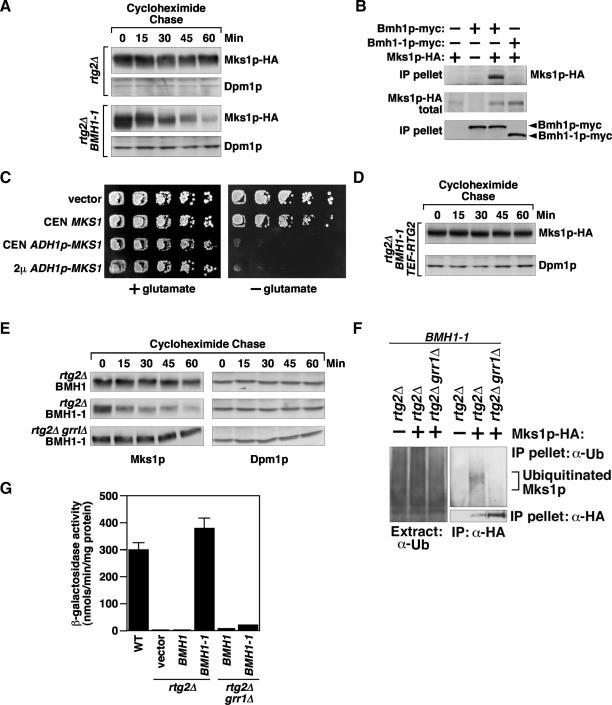Figure 3.
GRR1-dependent Mks1p instability in rtg2Δ BMH1-1 cells. (A) Mks1p is unstable in rtg2Δ BMH1-1 cells. Mks1p stability was examined in rtg2Δ or rtg2Δ BMH1-1 cells expressing Mks1p under the control of the ADH1 promoter using cycloheximide chase assay. (B) Mks1p-HA interacts with wild-type Bmh1p, but not mutant Bmh1-1p. Cell extracts of bmh1Δ bmh2Δ mks1Δ cells expressing the tagged proteins as indicated were obtained for immunoprecipitation. Anti-myc antibody was used to precipitate Bmh1p-myc and Bmh1-1p-myc. (C) Overexpression of MKS1 reverses the rtg2Δ bypass phenotype of the BMH1-1 mutation. rtg2Δ BMH1-1 cells expressing different levels of MKS1 were assayed for glutamate auxotrophy phenotype as described for Figure 2E. (D) Rtg2p protects Mks1p from degradation in BMH1-1 cells. Mks1p stability was examined in rtg2Δ BMH1-1 cells transformed with an integrated copy of RTG2 under the control of TEF1 promoter. (E) A grr1Δ mutation leads to Mks1p stability in rtg2Δ cells expressing BMH1-1. Mks1p stability was examined in rtg2Δ or rtg2Δ grr1Δ cells expressing wild-type BMH1 or BMH1-1 from a centromeric plasmid. (F) A grr1Δ mutation abolishes ubiquitination of Mks1p expressed from the ADH1 promoter in rtg2Δ cells expressing the mutant Bmh1-1p. Total cell extracts were prepared from cells as indicated expressing Mks1p-HA under the control of the ADH1 promoter. Mks1p-HA was immunoprecipitated using anti-HA antibody conjugated agarose beads. Anti-ubiquitin antibody was used to detect Mks1p ubiquitination. (G) A grr1Δ mutation reverses BMH1-1-induced CIT2-lacZ expression in rtg2Δ cells.

